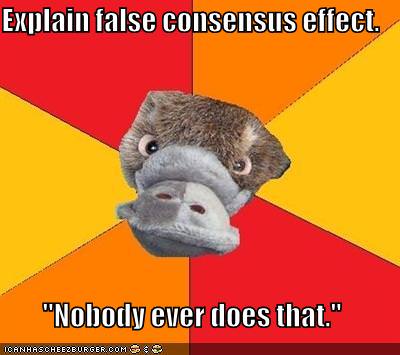How considering the psychology of your audience can yield more effective creative
I recently read this interesting psychology article about a phenomenon called the 'False Consensus Effect', which is directly applicable to so many situations. In a nutshell, it is about how people believe that most other people behave similarly to themselves, and if they don't, there must be something wrong with them (we all consider ourselves rational). However, in reality it is difficult to accurately predict the behaviour of others, and if they behave differently to us, or how we imagine they will behave, it is simply because they are different (despite usually also being completely rational).
 In the article above, the first study of the False Consensus Effect was a theoretical one, and the second a practical one which was employed to test (and ultimately, in this case, prove) the theoretical study.
In the article above, the first study of the False Consensus Effect was a theoretical one, and the second a practical one which was employed to test (and ultimately, in this case, prove) the theoretical study.
It is a useful social bias to take into consideration in business. People are inclined to think that the majority of other people agree with their judgements and opinions, which (whether true or not), makes them feel secure in their decisions. Therefore, by suggesting that others want a certain thing (for example a product you are promoting), whether they do or not, you can give the prospective customer the security of perceived consensus with others, massaging their decision-making process in the direction of a sale! It ties into the “Social proof your videos” psychology tip in our recent post on using social psychology in video marketing.
The study demonstrates exactly why we need psychology studies. Let's face it, most of us are sometimes guilty of thinking we know best, making assumptions without getting the true picture.
Getting the facts is essential to successful web optimisation, as demonstrated in this company's experience. They took the time and effort to find out all the relevant information, then made a theoretical diagnosis of what needed to be done, they then tested it in practice and measured the success. A great story of simple changes which have a substantial impact on business.
We have produced thousands of corporate videos, bringing tangible business benefits to our clients, but we wouldn't be foolish or arrogant enough to think we know exactly what your business needs without doing our research, but in our experience there are some common threads to what works and what does not. We've learnt them bit by bit. Even when we have done our research, we always test the effectiveness of what we implement in practice, which is why we offer a money back guarantee on our work if we cannot improve the performance of a client's website. We really encourage you to use the tools available to do the same on your website and find out how well different areas are performing (including any video you already have). Try using Google Analytics - more info on web analytics here.
I used to work in the trade exhibitions industry, and over the years encountered clients who had a some really fixed ideas of what kind of exhibition stands they wanted to build in order to deliver them the best business results. Often, when we had talked things through, the best solution for them was something quite different to what they had originally imagined, and regularly cost a lot less. Equally, I have seen other companies spend thousands on elaborate stands and displays, but not do the business they had anticipated.

Using video on your website is rather like having a permanent trade exhibition running for your brand, as it brings your company and products to life. If your video isn't just right, it could actually damage your brand and business, rather than enhancing it, so it's important to get it right, and then measure how well it is working. Similarly, the cost of making a major improvement need not be prohibitive.
Going back to the False Consensus Effect, it is human nature to imagine that other people see what you see and value what you value. You imagine that just because you know what you are trying to communicate, then so will your audience. In this way, people tend to become blind to the effectiveness (or otherwise) of their own marketing, or even if they are able to see that it needs improvement, can find it impossible to pinpoint the areas for concern.
It is always useful to have someone completely objective to look at your marketing communications, so you can have a truly unbiased opinion of how well they put across your message. You may be surprised by the results.
 It is essential to test and keep testing our online video performance over time in order to gain a true picture of how well your strategy is working. Often the influence of a marketing campaign in the decision making process has an element of time lag before it translates into sales, as the Google Analytics tool helps demonstrate. Here is a great article on video marketing on YouTube with analysis over time of the effect of video. It gives a pretty compelling picture of the value of video to your business.
It is essential to test and keep testing our online video performance over time in order to gain a true picture of how well your strategy is working. Often the influence of a marketing campaign in the decision making process has an element of time lag before it translates into sales, as the Google Analytics tool helps demonstrate. Here is a great article on video marketing on YouTube with analysis over time of the effect of video. It gives a pretty compelling picture of the value of video to your business.
We tend to work with our clients to analyse their digital marketing plan and together come up with an integrated video marketing strategy. A crucial element of this is the tracking, analysis and testing of all parts of the video strategy. We like to demonstrate how well our efforts work, rather than relying on people to behave how we expect them to. A strong video marketing strategy will deliver both immediate and long-term effects for your business.









